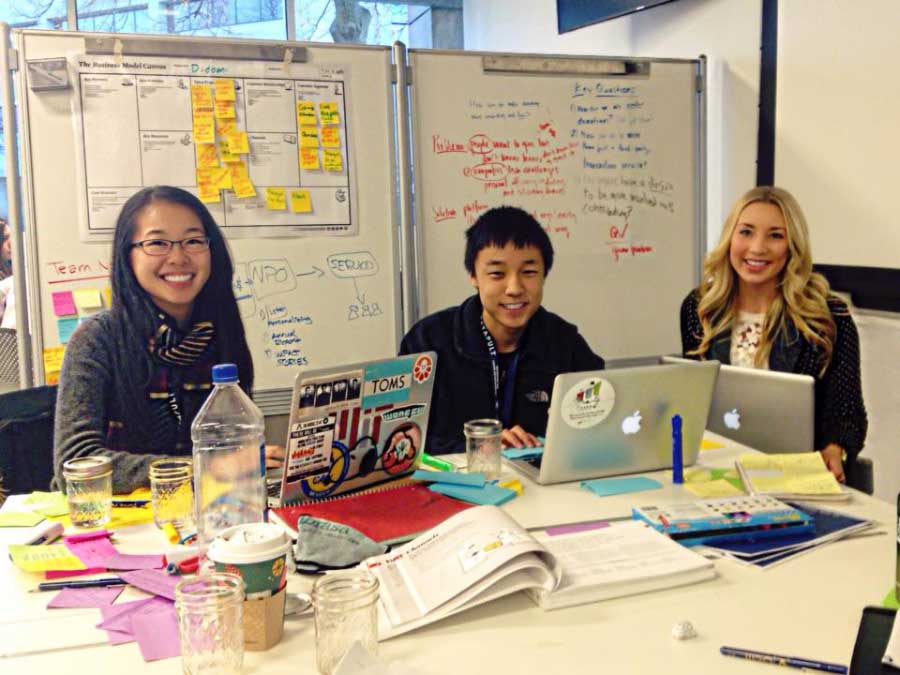
Wang with her cofounders of Didomi, Eric Qian and Jill Klinvex, working at the Harvard Innovation Lab.
On Nov. 21, junior Netta Wang flew to Boston, Massachusetts to attend the Harvard i-Lab, a business incubator designed to help students interested in entrepreneurship grow and expand their ventures. Before this year, the i-Lab only catered to Harvard students; however, Wang participates in Catapult, a program in which high school students spend three weekends a year at Harvard to develop their enterprises. At the i-Lab, Wang developed a business model for Didomi, an iPhone app that she started this past summer along with two other high school students, Eric Qian and Jillian Klinvex.
At the i-Lab, Wang and her partners planned the timeline until the summer of 2014, which is when they hope to launch their beta testing, or test their product with a select amount of users before its commercial release. Until then, the founders of Didomi are looking to finalize their programmer and continue developing their app.
Wang says, “It was an amazing experience. We got paired up with four Harvard business school mentors and five virtual mentors who Skype in with us.”
Didomi means “to give back” in Greek. It is an app that allows users to check out local charities and donate to those that appeal to them. Users can play games, watch ads, bid donations and win points to donate to a charity of their choice. Wang explains, “When they donate, it feels like a transaction. Because of that kind of gap between the personal connection aspects of it, a lot of charities, especially the smaller, local ones, were closing down, so, we really wanted to bridge them together and have the donors and the benefactors directly connected and create a community around causes that people are really interested in.”
As Didomi is a social enterprise, Wang says, “Personally, we’re not interested in [collecting] any money for ourselves. We are [collecting] money to put back into Didomi, though … to allow the company to grow bigger.”
Wang created Didomi at Launch, an entrepreneurship summer program at the Massachusetts Institute of Technology (MIT) made for high school students. At the program, students like Wang learned the business and leadership skills necessary to start a company. They went through interactive lectures and simulations to expand their knowledge on business. At the end of four weeks of classes on business skills, students at Launch had gathered up in teams to start companies with the goal of receiving funding by the end of the program.
Regarding her experience at Launch, Wang says, “Every morning, we would get up around seven and classes started at eight until 5 p.m.; and then we could work with our mentors until around dinner time. Then, until 3 a.m., we would be working on our company—so not a lot of sleep, but really fun.”
Wang credits Launch as her inspiration to pursue a career in business. She says, “The Launch program made me really aware that business and entrepreneurship is what I wanted to do because before then, I had no idea what I wanted to do in the future. It opened up to all these new resources and opportunities. It was probably the best month of my life.”
Wang concludes, “I’ve given up my Fridays to do all the meetings. It’s ten hours a week and I don’t think I really realized how much it would be, but I’m happier than I’ve ever been before with this company, and I really like where we’re going. I don’t think I’ve ever been passionate about something before this.”
Correction – Dec. 29, 2013: A previous version of this article referred to the Harvard i-Lab as a program; it is a business incubator. It stated Didomi would release a beta in April 2014; the beta is scheduled for release in the summer of 2014. It stated Didomi is a nonprofit organization; it is not.
